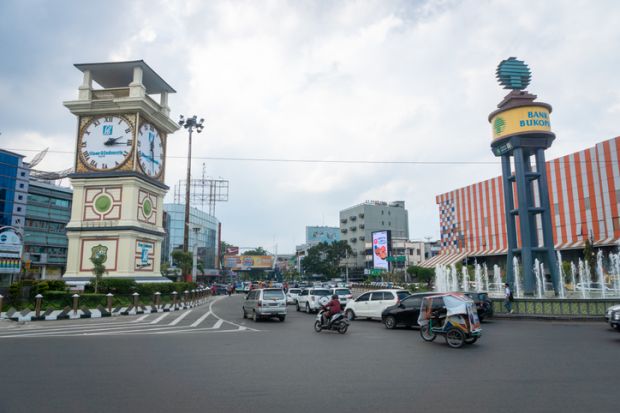Another Australian institution intends to establish a wholly owned campus in the world’s biggest Muslim majority nation, with Central Queensland University (CQU) pursuing a presence in the North Sumatran capital of Medan.
CQU’s vice-president for global development, Alastair Dawson, said the university was keen to establish a campus “in our own right” in Indonesia. It had targeted the nation’s fourth largest city because of the “enormous opportunities” in Sumatra.
Mr Dawson said the university expected to have an operating campus in Medan by the end of 2021 and was “working through the approval processes” to provide research programmes and undergraduate and postgraduate degrees.
The race for a base in Indonesia appears to be heating up, after Monash University claimed bragging rights as the first foreign institution with a stand-alone presence in the archipelago. Another top-ranked Australian university is thought to be investigating options in the country.
CQU says it bagged the first Australian university centre there when it opened a joint operation with private Bakrie University in March – in “possibly the worst timing in the world”, Mr Dawson acknowledged. The centre, located in South Jakarta’s embassy district of Kuningan, offers dual master’s degrees and corporate training programmes.
CQU is also expanding its roots in agricultural and particularly bovine research – it originated in the coastal Queensland city of Rockhampton, known as Australia’s beef capital – by pursuing an agreement to establish an agricultural technology park and research centre in the North Sulawesi capital of Manado.
The deal with Indonesia’s National Development Planning Agency (Bappenas) and Manado’s Sam Ratulangi University (Unsrat) would see CQU’s Institute of Future Farming Systems in Rockhampton replicated in Sulawesi.
The Medan and Manado proposals are likely to be welcomed by Indonesian authorities, which are keen to encourage development away from crowded Java and particularly Jakarta.
Mr Dawson said that while CQU had longstanding partnerships in Indonesia, it had “come to realise that we can contribute more by having a solid base”. But “true collaborations” remain key, he insisted.
“It’s easy enough to set up an operation in another country but if you’re doing it without trusted partnerships, it really doesn’t enhance the future for either party – for individuals or for universities,” he said.
“We never go into a partnership where we don’t expect that we will learn as much as we share.”
Meanwhile, Monash says it is a step closer to opening its branch campus in Jakarta after securing official legal status and a licence to operate from the Indonesian Ministry of Education and Culture.
Vice-chancellor Margaret Gardner said the campus would operate from a recently constructed but never previously occupied building in Bumi Serpong Damai, a planned community in South Tangerang in greater Jakarta’s south-west.
The university is now planning the building’s interior and has established a not-for-profit foundation or yayasan as the operation’s legal entity. Professor Gardner said she expected the first offerings – graduate certificates and diplomas, master’s degrees and PhDs in data science, business innovation, public health policy and urban design and planning – to begin in the second half of 2021.
She said the Indonesian government was particularly interested in digital transformation because the country was “very digitally oriented”, with relatively little reliance on landline communications. Mobile networks had given rise to “all sorts of services” that had not previously been available, she said.
Register to continue
Why register?
- Registration is free and only takes a moment
- Once registered, you can read 3 articles a month
- Sign up for our newsletter
Subscribe
Or subscribe for unlimited access to:
- Unlimited access to news, views, insights & reviews
- Digital editions
- Digital access to THE’s university and college rankings analysis
Already registered or a current subscriber? Login










